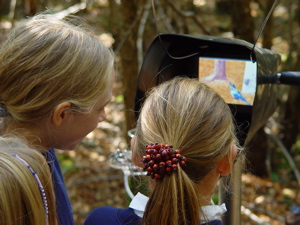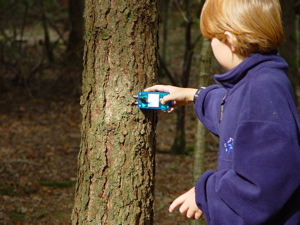A magazine where the digital world meets the real world.
On the web
- Home
- Browse by date
- Browse by topic
- Enter the maze
- Follow our blog
- Follow us on Twitter
- Resources for teachers
- Subscribe
In print
What is cs4fn?
- About us
- Contact us
- Partners
- Privacy and cookies
- Copyright and contributions
- Links to other fun sites
- Complete our questionnaire, give us feedback
Search:
If you go Down to the Woods Today...

Mark Weiser's dream of 'Calm Computing' has led to lots of exciting research that has seen computers disappearing into the background. His vision was driven by a desire to remove the frustration of using computers but also the realization that the most profound technologies are the ones that you just don't notice. He wanted technology to actively remove frustrations from everyday life, not just the ones caused by computers.
No one argues that computers should be frustrating to use, but Professor Yvonne Rogers of the Open University has a different idea of what the new vision could be. Not calm. Anything but calm in fact (apart from frustrating of course). Not calm, but engaging and exciting!
Her vision of those tranquil woods is not relaxing but provocative and playful. To prove the point her team turned some real woods in Sussex into an 'Ambient Wood'. The ambient wood was an enhanced wood. When you entered it you took probes with you, that you could point and poke with. They allowed you to take readings of different kinds in easy ways. Time hopping 'Periscopes' placed around the woods allowed you to see those patches of woodland at other times of the year. There was also a special woodland den where you could then see the bigger picture of the woods as all your readings were pulled together using computer visualisations.

Not only is the Ambient Wood technology visible and in your face but it makes the invisible side of the wood visible in a way that provokes questions about the wildlife. You notice more. You see more. You think more. A walk in the woods is no longer a passive experience but an active, playful one. Woods are the exciting places of childhood stories again but now there are even more things to explore.
The idea behind the Ambient Wood, and similar ideas like Bristol's Savannah project where playing fields are turned into African Savannah is to revisit the original idea of computers but in a new context. Computers started as tools, and tools don't disappear, they extend our abilities. Tools originally extended our physical abilities - a hammer allows us to hit things harder, a pulley to lift heavier things. They make us more effective and allow us to do things a mere human couldn't do alone. Computer technology can do a similar thing but for the human intellect...if we design them well.
The Weiser dream is that technology invisibly watches the world and removes the obstacles in the way before you even notice them. It's a little like the way servants to the aristocracy were expected to always have everything just right but at the same time were not to be noticed by those they served. The way this is achieved is to have technology constantly monitoring, understanding what is going on and how it might affect us and then calmly fixing things. The problem is it needs really 'smart' technology - a high level of Artificial Intelligence to achieve and that so far has proved more difficult than anyone imagined. Our behaviour and desires are full of subtlety and much harder to read than was imagined. Even a super-intellect would probably keep getting it wrong.
There are also ethical problems. If we do ever achieve the dream of total calm we might not like it. It is very easy to be gung ho with technology and not realize the consequences. Calm computing needs monitors - the computer measuring everything it can so it has as much information as possible to make decisions from (see Big Sister is Watching You).

A classic example of how this can lead to people rejecting technology intended to help is in a project to make a 'smart' residential home for the elderly. The idea was that by wiring up the house to track the residents and monitor them the nurses would be able to provide much better care, and relatives be able to see how things were going. The place was filled with monitors. For example, sensors in the beds measured resident's weight while they slept. Each night the occupants weight could invisibly be taken and the nurses alerted of worrying weight loss over time. The smart beds could also detect tossing and turning so someone having bad nights could be helped. A smart house could use similar technology to help you or I have a good nights sleep and help us diet.
The problem was the beds could tell other things too: things that the occupants preferred to keep to themselves. Nocturnal visitors also showed up in the records. That's the problem if technology looks after us every second of the day, the records may give away to others far more than we are happy with.
Yvonne's vision is different. It is not that the computers try to second-guess everything but instead extend our abilities. It is quite easy for new technology to lead to our being poorer intellectually than we were. Calculators are a good example. Yes we can do more complex sums quickly now, but at the same time without a calculator many people can't do the sums at all. Our abilities have both improved and been damaged at the same time. That is what the probes do, allowing you to see the woods in a new way, but to use the information however you wish. The probes encourage imagination.
The alternative to the smart house (or calculator) that pampers allowing your brain to stay in neutral, or the residential home that monitors you for the sake of the nurses and your relatives is one where the sensors are working for you. Where you are the one the bed reports to helping you to then make decisions about your health, or where the monitors you wear are part of a game that you play because its fun (see Fizees).
So if Yvonne has her way, you won't be heading for a soporific future while the computer deals with real life for you. Instead it will be a future where the computers are sparking your imagination, challenging you to think, filling you with delight...and where the woods come alive again just as they do in the storybooks.
Read the full cs4fn interview with Yvonne.


